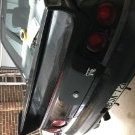Factory Turbo Life
Factory Turbo Life
27 members have voted
Announcements
-
Similar Content
-
Latest Posts
-
One thing I can tell you is, do it properly the first time. If you encounter unexpected problems just let the car sit for a week or two if you have to get some other parts or figure stuff out. I'd have said go and use as many OEM parts as possible but since you want to change the turbo later on a custom kit is probably the better choice. Since I have no experience with RB25 just compare parts diagrams and images before buying a line kit and it should be easy to see if it has everything you need. Amayama has very good parts diagrams and part number lists, that is what I used a bunch to figure out what I might need. And don't forget to plan ahead and possibly renew other stuff that's easy to get to while you're in there doing the turbo lines. Happy wrenching
-
Update 4: Hi all, good news. Engine is running and all the gaskets and seals seem to be working as intended. No leaks so far, even the JB Weld seems to hold. I flushed out the old coolant a few times and put in fresh coolant, not Nissan stuff, I decided to try the Ravenol Protect FL22, they claim it works for a wide variety of JDM cars and the opinions on it by some people were pretty good. And it has the nice poison green color! And man am I glad I bought a coolant system tester earlier this year, vacuum filling works wonders on this engine. I can definitely recommend this to anyone still doing it the old school way. All you need is compressed air supply. Will have to do a small test drive as soon as I can, I removed the gauge cluster again as the tacho needle was still bouncing around a bit but it was much better than before already. I also found some cracks on all 4 tires inner and outer sidewalls. Apparently these tires should 't be parked on for extended periods or be kept under 0 degrees during storage, which I did not know. Clearly the previous owner didn't look into those details either, he probably bought them just cause they are cool semi-slicks. I'm just wondering how tf I am supposed to reach 30-80 degree tire temperatures on the public road consistenly, these tires were never going to work for my use case. I'll probably order Continental SportContact7 ones as these are the best allround summer tire available right now and I don't think I'll need anything crazier for now. Do let me know if you have experience with various tires and which ones you recommend.
-
You have no idea how many goddamn boxes I received these past three months haha Most have been put to use by now though, luckily
-
Not going to pretend I didn't do a bit of junky work this time around, but mostly due to the fact that some things I am not willing to spend days fixing right now, like wiring. I try to do most things properly the first time around.
-
Regardless of neglect or incompetence, fixing either is tedious and annoying. Most of the neglect on my car is definitely rust. I hope I can at least pass inspections later on and they won't fail the car due to slightly corroded hardlines. I was generous with rust converter and wax and it looks ok, most lines in the rear are hard to see properly anyways. Definitely will test them though to make sure they don't rupture under pressure, in that case the car isn't going anywhere this year.
-





Recommended Posts
Create an account or sign in to comment
You need to be a member in order to leave a comment
Create an account
Sign up for a new account in our community. It's easy!
Register a new accountSign in
Already have an account? Sign in here.
Sign In Now